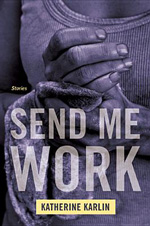

Triquarterly, paperback, 9780810152205
You know you're not sexist. Far from it. But when you hear that Katherine Karlin's short story collection Send Me Work is about women at work, you imagine secretaries dealing with male bosses, encountering romance with coworkers, perhaps a woman lawyer or doctor, but for sure all of them wearing heels. Why don't you think of women working in coveralls and boots, in refineries or train yards, women welding or driving big machines? Not that there aren't a few women on these pages doing more predictable work, including a musician and—yes—an office temp. Not that there isn't even a male protagonist in the mix. But still.
The first character you encounter quickly disabuses you of your gender stereotypes. In "Bye-Bye, Larry," Gina works in an oil refinery, knocks back a few beers with the boys in the evening, and on one dark night finds herself breaking into the executive women's washroom to steal tampons. This misadventure leads to an uneasy encounter with the new female plant manager, and early on you get the idea that Karlin's stories are more often about class divide than gender divide.
That's true of Nan, in the ironically titled "Underwater," who comes to Los Angeles as a loan officer, but doesn't last long at the bank. Instead, she ends up maintaining fish tanks for businesses. Why a woman with a four-year business degree chooses to swab out fish tanks is a tale Karlin reels out slowly. In Nan's words, "I was afraid of becoming an asshole." By the end of the story, you understand what she means. So will the people occupying Wall Street.
And that's the second quality you figure these stories share. They're like cocoons, simple on the outside but complex within. As they unravel, details from the beginning join details along the way until the story finally reveals its deepest secrets. The effect leaves you breathless with appreciation.
Your favorite story, "Muscle Memory," did this best. Destiny wants to become a welder like her father, hoping to contribute to the family coffers now that he's gone. You follow her persistent efforts to achieve her goal, and eventually you see the bigger picture: why her father's gone, why her mother hoards food in her bedroom closet, why everyone in this city is trying to find their way out of a dark place. The way you see it, only the best short stories manage to show a wide world in the simple turning of a person's life. Karlin does that, over and over again.
Finally, you see that most of these characters love their work. They wax eloquent about their endeavors, the materials they use, the products they make. That's true of the elderly ex-ad executive who remembers his love of words even as he loses his ability to use them. It's also true of the second oboe who knows she'll never be first, and the print shop customer-service rep: “Paper. She loved the smell of it, the feel of it in her hand—she could tell you blindfolded if you gave her a forty-pound vellum or a forty-eight-gram newsprint."
Even those who don't like their work are defined by their jobs and their coworkers. Somehow, you really get these people, even though their work is not yours, and their worlds are not ones you've visited before. You understand that we're all workers, and employment is the biggest issue of our day, of any day.
In the end, you leave this short story collection with respect for Karlin and the plucky individuals with whom she
peoples her tales. Their courage gives you courage, and you end up doing something she does in her moving
story, "Seven Reasons": you write a book review in second person. Why not? This is your work, and you love it.
